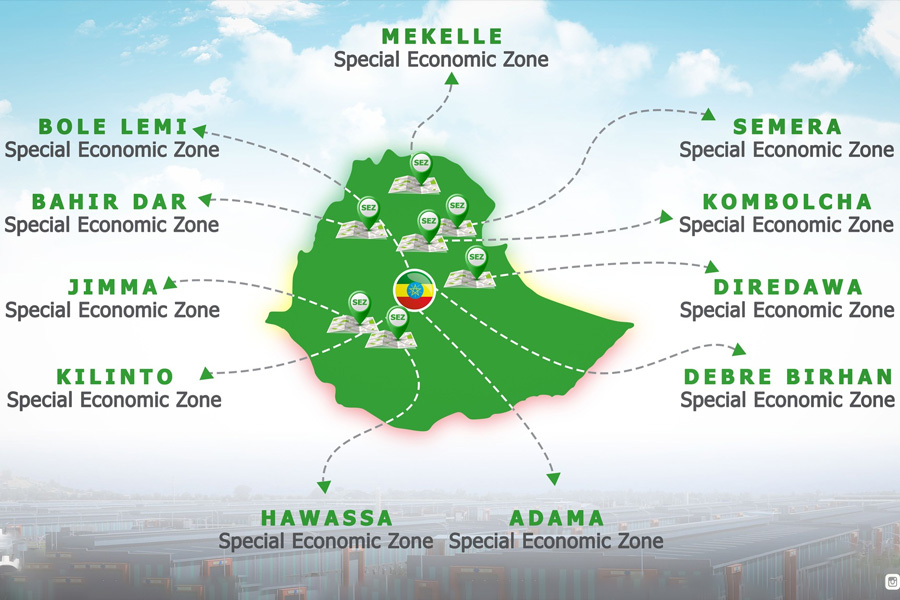
Radar | Oct 19,2024
Nov 18 , 2023.
Prime Minister Abiy Ahmed (PhD) has made a fervent call for landlocked Ethiopia to gain maritime access in a brazen move that has reignited a historical debate. His pronouncements in Parliament last week, addressing concerns raised after President Sahleworq Zewdie's motion to the joint session of the legislative houses, emphasised Ethiopia's "right" to sea access, invoking a mix of historical, economic, and demographic reasons.
However, these factors alone are insufficient to compel neighbouring countries to accede to Ethiopia’s aspirations. Unsurprisingly, it has spurred a wave of reactions across the political spectrum, both domestically and in the wider Horn of Africa region and beyond.
Ethiopia's quest for sea access is not new; it is a longing deeply embedded in the national psyche, tracing back over six centuries. The country briefly enjoyed a coastline after annexing Eritrea in the 1960s, a situation that lasted for about three decades until Eritrea became an independent country in the early 1990s. The historical context could be crucial. Emperor Haile Selassie's success in securing coastal access was mainly due to his international prestige and the diplomatic prowess of his officials. However, his decision to dissolve the federation with Eritrea set the stage for Eritrea's eventual independence after Mengistu Haile Mariam's (Col.) regime fell.
Abiy's aspiration to reclaim sea access, rooted in historical claims, is a complex and potentially contentious issue. His acknowledgement of the potential consequences of a disruption in access to Djibouti’s ports stresses the need for Ethiopia to diversify its maritime options. While securing alternative port access may sound like a logical step, it should be pursued in a manner that promotes regional cooperation and mutual benefit.
It is implausible that neighbouring coastal countries voluntarily cede sovereign territory to Ethiopia, barring a forceful takeover, which would undeniably destabilise the region. The political landscape suggests that Ethiopia's path to maritime access is fraught with geopolitical rollercoaster.
Abiy's approach, however, sounds not solely confrontational. He has expressed a willingness to engage in dialogue, a reassuring signal to neighbouring countries and the international community. To the extent that he wanted to see the issue claim the forefront of public and political debate, he has succeeded. Indeed, the Prime Minister's parliamentary address, where he broached the subject, garnered significant regional and international attention.
A particularly striking aspect of Abiy's strategy is his proposal to trade stakes in Ethiopia's major state-owned enterprises, including Ethiopian Airlines and the Grand Ethiopian Renaissance Dam (GERD), for maritime access. It reflects a pragmatic recognition of Ethiopia's economic needs.
With a population exceeding 100 million and an economy surpassing 100 billion dollars, Ethiopia faces considerable logistical challenges as a landlocked country. The Prime Minister voiced the vulnerability of Ethiopia's economy, which relies heavily on Djibouti ports for its import and export cargoes. He painted a grim picture of the potential consequences should access to these ports be jeopardised, particularly given Djibouti's geopolitical significance, hosting numerous foreign military bases.
Their presence is a reminder of the broader geopolitical issue of the strategic importance of the Red Sea.
The withdrawal of the United States from a dominant role in the region has created a vacuum, now being filled by middle regional powers. The Red Sea is increasingly becoming a theatre for Middle Eastern rivalries, with countries like Egypt, Saudi Arabia, the United Arab Emirates (UAE), Turkey, and Qatar vying for influence. This geopolitical tussle has led to the region's militarisation and increased instability.
However, the Red Sea is not just a regional concern but a vital artery in global trade. The security of critical chokepoints like the Suez Canal and the Bab-el-Mandeb Strait is of global significance. Any regional disruption could have far-reaching implications for international trade and security.
Demographically, the region is witnessing a shift towards a younger, more politically fired-up generation, increasingly disenchanted with existing political orders and economic structures. This demographic change is reshaping the political landscape, not just in Ethiopia but across the Horn of Africa. It is a region that is becoming increasingly important, linking the security systems of the Middle East, the Indo-Pacific, and the Mediterranean.
Ethiopia's maritime aspirations can be viewed within this larger strategic context. It would require it to position itself not just as a country seeking to regain a lost maritime legacy but as a proactive and constructive player in regional affairs.
While age-old, Ethiopia's focus on maritime access might be too narrow. A more comprehensive strategic approach would consider Ethiopia's role in the broader geopolitical landscape of the Red Sea Arena. Instead of fixating on port ownership, Ethiopia’s contemporary leaders could reorient their foreign policy towards promoting economic cooperation and stability in the Red Sea Arena, comprising no less than 18 countries.
Ethiopia's historical quest for sea access, often charged with emotion and convoluted with the ownership of port assets, risks being perceived as a threat by neighbouring countries unless it is reframed as part of a larger strategy for regional cooperation and stability. A unilateral focus on maritime access could potentially lead to conflicts while a collaborative approach could transform the Red Sea Arena from a battleground of geopolitical competition into a platform for economic partnership and regional stability.
Ethiopia's aspiration for maritime access may be rooted in its historical and economic needs, but its realisation in the current geopolitical climate requires a nuanced approach and strategic thought.
The challenge for Prime Minister Abiy and his administration is to balance these aspirations with the realities of regional politics and global strategic interests. It also lies in crafting a narrative that respects the sovereignty of neighbouring countries while advancing Ethiopia’s strategic interests.
A broader, more inclusive strategy beyond maritime access to encompass regional cooperation and stability in the Red Sea Arena could offer Ethiopia and its neighbours a more sustainable and peaceful path forward. By navigating these challenges with strategic acumen and diplomatic skill, Ethiopia can have the potential to not only secure maritime access but also contribute to the creation of a more stable and interconnected Horn of Africa.
PUBLISHED ON
Nov 18,2023 [ VOL
24 , NO
1229]

Radar | Oct 19,2024

Viewpoints | Feb 20,2021

Radar | Dec 05,2020

Viewpoints | Jul 01,2023

Radar | Dec 08,2024

Viewpoints | Jul 22,2023

Commentaries | May 11,2019

Fortune News | Feb 27,2021

News Analysis | Mar 09,2024

Radar | Jan 19,2019

My Opinion | 132120 Views | Aug 14,2021

My Opinion | 128523 Views | Aug 21,2021

My Opinion | 126450 Views | Sep 10,2021

My Opinion | 124061 Views | Aug 07,2021

Dec 22 , 2024 . By TIZITA SHEWAFERAW
Charged with transforming colossal state-owned enterprises into modern and competitiv...

Aug 18 , 2024 . By AKSAH ITALO
Although predictable Yonas Zerihun's job in the ride-hailing service is not immune to...

Jul 28 , 2024 . By TIZITA SHEWAFERAW
Unhabitual, perhaps too many, Samuel Gebreyohannes, 38, used to occasionally enjoy a couple of beers at breakfast. However, he recently swit...

Jul 13 , 2024 . By AKSAH ITALO
Investors who rely on tractors, trucks, and field vehicles for commuting, transporting commodities, and f...

Jul 13 , 2025 . By YITBAREK GETACHEW
The Addis Abeba City Revenue Bureau has introduced a new directive set to reshape how...

Jul 13 , 2025 . By BEZAWIT HULUAGER
Addis Abeba has approved a record 350 billion Br budget for the 2025/26 fiscal year,...

Jul 13 , 2025 . By RUTH BERHANU
The Addis Abeba Revenue Bureau has scrapped a value-added tax (VAT) on unprocessed ve...

Jul 13 , 2025 . By NAHOM AYELE
Federal lawmakers have finally brought closure to a protracted and contentious tax de...